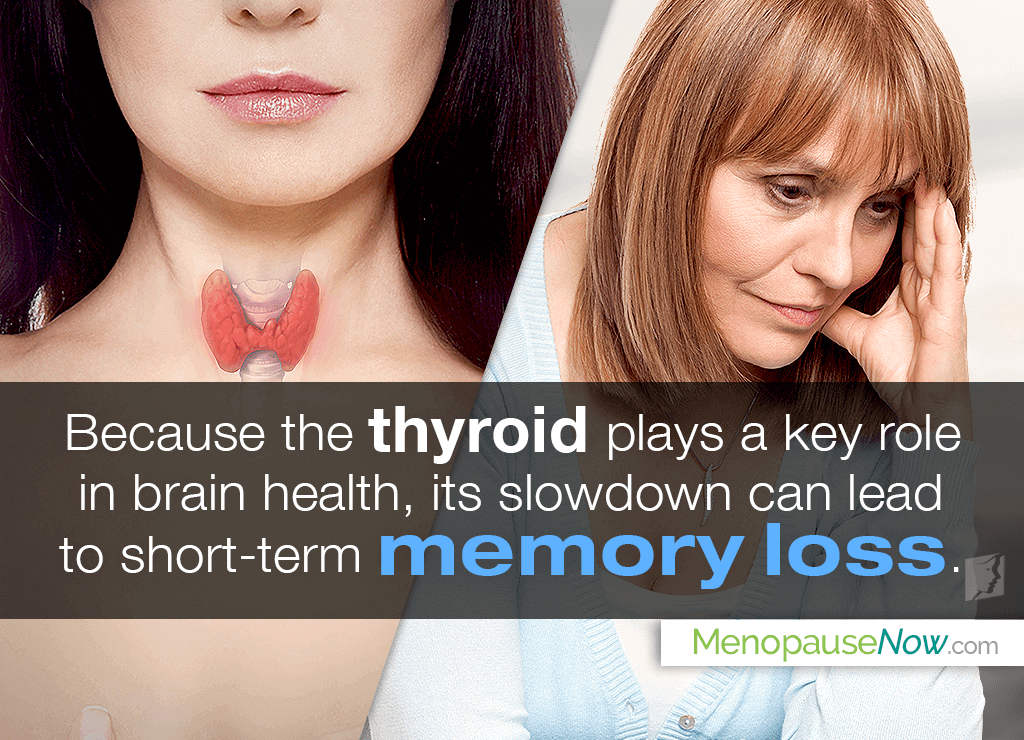Many middle-aged women experience a plethora of physical and psychological symptoms, among them being memory lapses. It is important they consider any underlying thyroid conditions at play, especially since women are five to eight times more likely to suffer from thyroid problems than men.1
Continue reading to learn all about thyroid and memory loss, including how the two are connected and what can be done for long-term cognitive health.
About the Thyroid and Its Diseases
The thyroid is an endocrine gland located in the neck that controls metabolism, growth, and development in the body, from the brain and the heart to the skin, liver, kidneys, bones, and more.
There are two main thyroid diseases: hypothyroidism and hyperthyroidism. Hypothyroidism is when the thyroid gland is underactive, while hyperthyroidism is the opposite.
Both can be caused by autoimmune diseases, iodine deficiency, nodules, tumors, medical treatments, or inflammation, among other factors.
How are Thyroid and Memory Loss Connected?
Hypothyroidism - underproduction of thyroid hormones - has been scientifically studied and proven to cause difficulty concentrating in addition to short-term memory loss.2
Throughout life, thyroid hormones are essential for cerebral function and maturation, also regulating neural development in the central nervous system (CNS).
As such, when the thyroid gland is underactive, there is a slowdown in brain and bodily functions causing symptoms that include fatigue, weight gain, dry skin, constipation, cold intolerance, memory problems, decreased attentiveness, and more.
Should I Be Concerned?
Middle-aged women who suspect a thyroid disease causing their memory lapses should promptly consult their doctors.
Only he or she will be able to run appropriate diagnostic testing to instill an effective treatment plan, which can consist of daily use of thyroid medications like levothyroxine.
Studies have shown that women suffering from psychological effects of hypothyroidism generally improve with the use of medications, as long as the symptoms are related to thyroid dysfunction.2
What Else Can Be Done?
If a doctor has disproved the presence of a thyroid disease, aging women may accredit their harrying symptoms to hormonal fluctuations taking place in their bodies during perimenopause.
In which case, improving endocrine system health would do the most good in relieving symptoms. Effective measures include:
Optimizing diet to include all essential micro- and macronutrients for proper nourishment and brain power
Partaking in regular exercise for increased blood circulation to the brain for a subsequent mood boost, enhanced cognition, and reduced anxiety levels3
Practicing wholesome habits that comprise of avoiding cigarettes, tobacco, and excessive alcohol consumption while relieving stress through relaxation techniques
Using alternative medicine, specifically phytoestrogenic herbal supplements or hormone-regulating herbal supplements
In general, middle-aged women should rest assured that memory lapses treatments are as varied as they are available. All it takes is a little willpower and the right attitude to start indulging in a symptom-free life again!
Sources
- Bernal, J. (2015). Thyroid Hormones in Brain Development and Function. Retrieved December 12, 2019, from https://www.ncbi.nlm.nih.gov/books/NBK285549/
- British Thyroid Foundation. (n.d.). Your thyroid gland | Psychological symptoms and thyroid disorders. Retrieved December 11, 2019, from https://www.btf-thyroid.org/what-is-thyroid-disorder | https://www.btf-thyroid.org/psychological-symptoms-and-thyroid-disorders
- Harvard Health Publishing. (2019). The lowdown on thyroid slowdown. Retrieved December 11, 2019, from https://www.health.harvard.edu/diseases-and-conditions/the-lowdown-on-thyroid-slowdown
- Healthdirect. (2018). Causes of thyroid problems. Retrieved December 11, 2019, from https://www.healthdirect.gov.au/causes-of-thyroid-problems
Footnotes:
- American Thyroid Association. (n.d.). General Information/Press Room. Retrieved December 11, 2019, from https://www.thyroid.org/media-main/press-room/
- Samuels, M.H. (2014). Psychiatric and cognitive manifestations of hypothyroidism. Current Opinion in Endocrinology, 21(5), 377-383. doi: 10.1097/MED.0000000000000089
- Sharma, A. et al. (2006). Exercise for Mental Health. The Primary Care Companion to the Journal of Clinical Psychiatry, 8(2), 106. doi: 10.4088/pcc.v08n0208a




